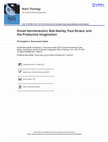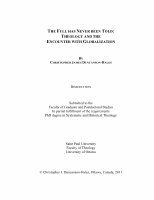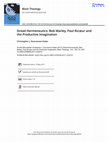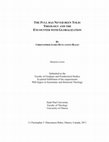Publications by Christopher J Duncanson-Hales

Black Theology: An International Journal, 2017
Abstract: This article presents Paul Ricœur’s hermeneutic of the productive imagination as a meth... more Abstract: This article presents Paul Ricœur’s hermeneutic of the productive imagination as a methodological tool for understanding the innovative social function of texts that in exceeding their semantic meaning, iconically augment reality. Through the reasoning of Rastafari elder Mortimo Planno’s unpublished text, Rastafarian: The Earth’s Most Strangest Man, and the religious and biblical signification from the music of his most famous postulate, Bob Marley, this article applies Paul Ricœur’s schema of the religious productive imagination to conceptualize the metaphoric transfer from text to life of verbal and iconic images of Rastafari’s hermeneutic of word, sound and power. This transformation is accomplished through what Ricœur terms the phenomenology of the iconic augmentation of reality. Understanding this semantic innovation is critical to understanding the capacity of the religious imagination to transform reality as a proclamation of hope in the midst of despair.

With the advent of the digital age and new mediums of communication, it is becoming increasingly ... more With the advent of the digital age and new mediums of communication, it is becoming increasingly important for those interested in the interpretation of religious text to look beyond traditional ideas of text and textuality to find the sacred in unlikely places. Philosophical and theological hermeneutics have been invigorated by a de-regionalization of the interpretation of text.
Paul Ricoeur’s phenomenological reorientation of classical hermeneutics from romanticized notions of authorial intent and psychological divinations to a serious engagement with the “science of the text” is a hermeneutical tool that opens up an important dialogue between the interpreter, the world of the text, and the contemporary world in front of the text.
This article examines three significant insights that Paul Ricoeur contributes to our expanding understanding of text. First under scrutiny will be Ricoeur’s de-regionalization of classic hermeneutics culminating in his understanding of Dasein (Being) as “being-in-the-world,” allowing meaning to transcend the physical boundaries of the text. Next, Ricoeur’s threefold under-standing of traditionality/Traditions/tradition as the “chain of interpretations” through which religious language transcends the temporal boundary of historicity will be explored. The final section will focus on Ricoeur’s understanding of the productive imagination and metaphoric truth as the under-appreciated yet key insight around which Ricoeur’s philosophical investigation into the metaphoric transfer from text to life revolves.

My thesis, The Full Has Never Been Told: Theology and the Encounter with Globalization, is an inv... more My thesis, The Full Has Never Been Told: Theology and the Encounter with Globalization, is an investigation of the encounter between religion and globalization. Rastafari reggae performer Buju Banton's song, Untold Story (Banton, 2002) recounts a variety of injustices and sufferings inflicted on 'low-budget people', each concluding with the refrain, "I could go on and on, the full has never been told." The full has never been told is the
hermeneutical orientation of my research that encapsulates the suffering of the wretched of the earth as they encountered the oppressive forces of globalization and the hope that inevitably
emerges from this encounter.
My research begins with an understanding of globalization not as a clash of civilizations, but as a clash of symbols and metaphors. An important insight I have investigated is the
theoretical significance of the 'deterritorialization' of symbols as a primary, long run driving force of economic, political, and social globalization and globalizations encounter in the
developing world as a boundary situation. The Caribbean's experience of transatlantic slavery, colonization/decolonization, the in-migration of indentured labour, and the continued out migration of West Indian's through-out the globe represents the first clash with the boundary situation of globalization. Paul Ricoeur identifies boundary situations as encounters with "war,
suffering, guilt, death and so which the individual or community experience as a fundamental existential crisis." In the Caribbean, these boundary situations require solutions beyond purely political, economic or technical means. They demand, as Ricoeur notes, "we ask ourselves the ultimate question concerning our origins and ends: Where do we come from? Where are we going? In this way we become aware of our basic capacities and reason for surviving, for being and continuing to be what we are." These questions and contradictions are at the core of theology's encounter with globalization.
The hypothesizes that I sought to prove is: if leading social scientific theorists of globalization are correct in their assessment of the importance of communication and symbolic
exchanges to globalization then a hermeneutic of the productive imagination that is attentive to symbol and myth is a critical analytic tool for reflection on globalization. Such a hermeneutic has the advantage of locating globalization as both the text and context of theological and social scientific analysis. Rastafari contributes to reflections on this encounter through its
interpretation of the symbolic importance of word, sound and power thus situating it as a grassroots example of a hermeneutic of liberation in praxis that recharges theological language through the re-enactment, re-enforcement and re-embodiment of symbol and myth.
This project employed an interdisciplinary methodology using Paul Ricoeur's phenomenological hermeneutic of the productive imagination, Niklas Luhmann and Peter Beyer's social theory of the communicative characteristic of global society and Rastafari's interpretation of word, sound and power in their encounter with globalization. The theoretical framework of my project follows Paul Ricoeur's hermeneutic arc. The first moment of the arc, pre-understanding, introduces the historical framework of globalization and religion. In the second moment of the arc, configuration, this framework is configured with Ricoeur's presentation of the productive imagination to present a
hermeneutic model for understanding and explaining the symbolic and mythic encounter of globalization. In the final moment of the arc, application, the Rastafari hermeneutic of
word, sound and power emerging from the Rastafari experience of globalization shows itself as an exemplar of an ontology of hope that has passed through despair. This interdisciplinary methodology has sought to bridge the gap between theological
reflection and social scientific theory. These theories complement one another as they draw our
attention to the surplus of meaning inherent in any text, discourse, or meaningful action. Ricoeur, Luhmann, and Beyer start from the centrality of meaning to human existence recognizing that meaning is set against a foreground, or horizon of possible meaning. This is the surplus of meaning that Ricoeur's hermeneutics attempts to make sense of and the conceptualization of society in terms of meaning-processing systems of communication advanced by Luhmann and Beyer.
Communication is at the heart of Luhmann and Beyer's theory of social systems and communications are ultimately symbolic exchanges that "can be conceptualized as a kind of self-excitation that inundates the system with meaning" (Luhmann, 1995, 171 ). Getting at this surplus of meaning is the central task of Paul Ricoeur's hermeneutics and Rastafari reasoning through word, sound and power. The reconfiguration ofthese theoretical perspectives has yielded valuable insights into the interpretation of the symbols and discourse of globalization making a unique contribution to theological knowledge.
Talks by Christopher J Duncanson-Hales
This essay is a revised version of a memorial paper presented at the 2008 annual meeting of the C... more This essay is a revised version of a memorial paper presented at the 2008 annual meeting of the Canadian Association for Studies in International Development in Vancouver, British Columbia. Dr. Farokh Afshar, (1945-2007), proposed a new vision for development studies that critically examined the issues, opportunities and challenges relating to spirituality and ethics in international development. From my own journey with development and theological studies, this paper seeks to further the conversation by making an empirical case for the inclusion of religion in development studies while proposing a hermeneutical framework for deepening development thinking beyond the “empiricism of the senses and the reasoning of the mind.”
Teaching Documents by Christopher J Duncanson-Hales
This course is designed to prepare students to succeed as they make the transition from secondary... more This course is designed to prepare students to succeed as they make the transition from secondary to post-secondary education. The course emphasizes setting priorities, time management, effective listening, note taking, concentration techniques, retention of information, critical thinking, text analysis and comprehension, and test-taking skills. This course also incorporates modules that are designed to facilitate the use of library databases in conducting research, planning and setting educational objectives, lifelong career assessment and decision making, financial aid, tutoring and student support services, enabling the student to maximize the use of university resources
Research by Christopher J Duncanson-Hales
Papers by Christopher J Duncanson-Hales

This article presents Paul Ricoeur's hermeneutic of the productive imagination as a methodologica... more This article presents Paul Ricoeur's hermeneutic of the productive imagination as a methodological tool for understanding the innovative social function of texts that in exceeding their semantic meaning, iconically augment reality. Through the reasoning of Rastafari elder Mortimo Planno's unpublished text, Rastafarian: The Earth's Most Strangest Man, and the religious and biblical signification from the music of his most famous postulate, Bob Marley, this article applies Paul Ricoeur's schema of the religious productive imagination to conceptualize the metaphoric transfer from text to life of verbal and iconic images of Rastafari's hermeneutic of word, sound and power. This transformation is accomplished through what Ricoeur terms the phenomenology of the iconic augmentation of reality. Understanding this semantic innovation is critical to understanding the capacity of the religious imagination to transform reality as a proclamation of hope in the midst of despair.

Finally, I owe so much to my wife, Melody. Without your spiritual, emotional and material support... more Finally, I owe so much to my wife, Melody. Without your spiritual, emotional and material support and sacrifice, I would never have been able to live up to my potential. The day we married, you promised to laugh with me in joy, to grieve with me in sorrow, to grow with me in love, and to care with me for others. When times were tough it was you who helped me see beyond the present. Your steadfast refusal to entertain even the suggestion of 'quitting' is the perseverance that made this thesis possible. I pray that our convenant to protect, comfort, and challenge each other continues to grow and promise to always cherish the holy in you as you have cherished the holy in me. The sudden vogue of such a grande idée, crowding out almost everything else for a while, is due, she says, "to the fact that all sensitive and active minds turn at once to exploiting it. .. After we have become familiar with the new idea, however, after it has become part of our general stock of theoretical concepts, our expectations are brought more into balance with its actual uses, and its excessive popularity is ended. A few zealots persist in the old key to the universe view of it; but less driven thinkers settle down after a while to the problems the idea has really generated.
Postscripts: The Journal of Sacred Texts and Contemporary Worlds, Jan 13, 2014
How can language be put to such diverse uses as mathematics and myth, physics and art? It is no a... more How can language be put to such diverse uses as mathematics and myth, physics and art? It is no accident that we ask ourselves this question today. We have at our disposal a symbolic logic, an exegetical science, an anthropology, and a psychoanalysis, and perhaps for the first time, we are able to encompass in a single question the problem of the unification of human discourse.

Postscripts: The Journal of Sacred Texts and Contemporary Worlds, 2013
With the advent of the digital age and new mediums of communication, it is becoming increasingly ... more With the advent of the digital age and new mediums of communication, it is becoming increasingly important for those interested in the interpretation of religious text to look beyond traditional ideas of text and textuality to find the sacred in unlikely places. Philosophical and theological hermeneutics have been invigorated by a de-regionalization of the interpretation of texts that corresponds with this journal’s mandate to “cross traditional boundaries, bringing different disciplinary tools to the process of analysis and opening up a sustained dialogue between and among scholars and others who are interested in religion, textuality, media, and mediation and the contemporary world.” Paul Ricoeur’s phenomenological reorientation of classical hermeneutics from romanticized notions of authorial intent and psychological divinations to a serious engagement with the “science of the text” is a hermeneutical tool that opens up an important dialogue between the interpreter, the world of t...









Uploads
Publications by Christopher J Duncanson-Hales
Paul Ricoeur’s phenomenological reorientation of classical hermeneutics from romanticized notions of authorial intent and psychological divinations to a serious engagement with the “science of the text” is a hermeneutical tool that opens up an important dialogue between the interpreter, the world of the text, and the contemporary world in front of the text.
This article examines three significant insights that Paul Ricoeur contributes to our expanding understanding of text. First under scrutiny will be Ricoeur’s de-regionalization of classic hermeneutics culminating in his understanding of Dasein (Being) as “being-in-the-world,” allowing meaning to transcend the physical boundaries of the text. Next, Ricoeur’s threefold under-standing of traditionality/Traditions/tradition as the “chain of interpretations” through which religious language transcends the temporal boundary of historicity will be explored. The final section will focus on Ricoeur’s understanding of the productive imagination and metaphoric truth as the under-appreciated yet key insight around which Ricoeur’s philosophical investigation into the metaphoric transfer from text to life revolves.
hermeneutical orientation of my research that encapsulates the suffering of the wretched of the earth as they encountered the oppressive forces of globalization and the hope that inevitably
emerges from this encounter.
My research begins with an understanding of globalization not as a clash of civilizations, but as a clash of symbols and metaphors. An important insight I have investigated is the
theoretical significance of the 'deterritorialization' of symbols as a primary, long run driving force of economic, political, and social globalization and globalizations encounter in the
developing world as a boundary situation. The Caribbean's experience of transatlantic slavery, colonization/decolonization, the in-migration of indentured labour, and the continued out migration of West Indian's through-out the globe represents the first clash with the boundary situation of globalization. Paul Ricoeur identifies boundary situations as encounters with "war,
suffering, guilt, death and so which the individual or community experience as a fundamental existential crisis." In the Caribbean, these boundary situations require solutions beyond purely political, economic or technical means. They demand, as Ricoeur notes, "we ask ourselves the ultimate question concerning our origins and ends: Where do we come from? Where are we going? In this way we become aware of our basic capacities and reason for surviving, for being and continuing to be what we are." These questions and contradictions are at the core of theology's encounter with globalization.
The hypothesizes that I sought to prove is: if leading social scientific theorists of globalization are correct in their assessment of the importance of communication and symbolic
exchanges to globalization then a hermeneutic of the productive imagination that is attentive to symbol and myth is a critical analytic tool for reflection on globalization. Such a hermeneutic has the advantage of locating globalization as both the text and context of theological and social scientific analysis. Rastafari contributes to reflections on this encounter through its
interpretation of the symbolic importance of word, sound and power thus situating it as a grassroots example of a hermeneutic of liberation in praxis that recharges theological language through the re-enactment, re-enforcement and re-embodiment of symbol and myth.
This project employed an interdisciplinary methodology using Paul Ricoeur's phenomenological hermeneutic of the productive imagination, Niklas Luhmann and Peter Beyer's social theory of the communicative characteristic of global society and Rastafari's interpretation of word, sound and power in their encounter with globalization. The theoretical framework of my project follows Paul Ricoeur's hermeneutic arc. The first moment of the arc, pre-understanding, introduces the historical framework of globalization and religion. In the second moment of the arc, configuration, this framework is configured with Ricoeur's presentation of the productive imagination to present a
hermeneutic model for understanding and explaining the symbolic and mythic encounter of globalization. In the final moment of the arc, application, the Rastafari hermeneutic of
word, sound and power emerging from the Rastafari experience of globalization shows itself as an exemplar of an ontology of hope that has passed through despair. This interdisciplinary methodology has sought to bridge the gap between theological
reflection and social scientific theory. These theories complement one another as they draw our
attention to the surplus of meaning inherent in any text, discourse, or meaningful action. Ricoeur, Luhmann, and Beyer start from the centrality of meaning to human existence recognizing that meaning is set against a foreground, or horizon of possible meaning. This is the surplus of meaning that Ricoeur's hermeneutics attempts to make sense of and the conceptualization of society in terms of meaning-processing systems of communication advanced by Luhmann and Beyer.
Communication is at the heart of Luhmann and Beyer's theory of social systems and communications are ultimately symbolic exchanges that "can be conceptualized as a kind of self-excitation that inundates the system with meaning" (Luhmann, 1995, 171 ). Getting at this surplus of meaning is the central task of Paul Ricoeur's hermeneutics and Rastafari reasoning through word, sound and power. The reconfiguration ofthese theoretical perspectives has yielded valuable insights into the interpretation of the symbols and discourse of globalization making a unique contribution to theological knowledge.
Talks by Christopher J Duncanson-Hales
Teaching Documents by Christopher J Duncanson-Hales
Research by Christopher J Duncanson-Hales
Papers by Christopher J Duncanson-Hales
Paul Ricoeur’s phenomenological reorientation of classical hermeneutics from romanticized notions of authorial intent and psychological divinations to a serious engagement with the “science of the text” is a hermeneutical tool that opens up an important dialogue between the interpreter, the world of the text, and the contemporary world in front of the text.
This article examines three significant insights that Paul Ricoeur contributes to our expanding understanding of text. First under scrutiny will be Ricoeur’s de-regionalization of classic hermeneutics culminating in his understanding of Dasein (Being) as “being-in-the-world,” allowing meaning to transcend the physical boundaries of the text. Next, Ricoeur’s threefold under-standing of traditionality/Traditions/tradition as the “chain of interpretations” through which religious language transcends the temporal boundary of historicity will be explored. The final section will focus on Ricoeur’s understanding of the productive imagination and metaphoric truth as the under-appreciated yet key insight around which Ricoeur’s philosophical investigation into the metaphoric transfer from text to life revolves.
hermeneutical orientation of my research that encapsulates the suffering of the wretched of the earth as they encountered the oppressive forces of globalization and the hope that inevitably
emerges from this encounter.
My research begins with an understanding of globalization not as a clash of civilizations, but as a clash of symbols and metaphors. An important insight I have investigated is the
theoretical significance of the 'deterritorialization' of symbols as a primary, long run driving force of economic, political, and social globalization and globalizations encounter in the
developing world as a boundary situation. The Caribbean's experience of transatlantic slavery, colonization/decolonization, the in-migration of indentured labour, and the continued out migration of West Indian's through-out the globe represents the first clash with the boundary situation of globalization. Paul Ricoeur identifies boundary situations as encounters with "war,
suffering, guilt, death and so which the individual or community experience as a fundamental existential crisis." In the Caribbean, these boundary situations require solutions beyond purely political, economic or technical means. They demand, as Ricoeur notes, "we ask ourselves the ultimate question concerning our origins and ends: Where do we come from? Where are we going? In this way we become aware of our basic capacities and reason for surviving, for being and continuing to be what we are." These questions and contradictions are at the core of theology's encounter with globalization.
The hypothesizes that I sought to prove is: if leading social scientific theorists of globalization are correct in their assessment of the importance of communication and symbolic
exchanges to globalization then a hermeneutic of the productive imagination that is attentive to symbol and myth is a critical analytic tool for reflection on globalization. Such a hermeneutic has the advantage of locating globalization as both the text and context of theological and social scientific analysis. Rastafari contributes to reflections on this encounter through its
interpretation of the symbolic importance of word, sound and power thus situating it as a grassroots example of a hermeneutic of liberation in praxis that recharges theological language through the re-enactment, re-enforcement and re-embodiment of symbol and myth.
This project employed an interdisciplinary methodology using Paul Ricoeur's phenomenological hermeneutic of the productive imagination, Niklas Luhmann and Peter Beyer's social theory of the communicative characteristic of global society and Rastafari's interpretation of word, sound and power in their encounter with globalization. The theoretical framework of my project follows Paul Ricoeur's hermeneutic arc. The first moment of the arc, pre-understanding, introduces the historical framework of globalization and religion. In the second moment of the arc, configuration, this framework is configured with Ricoeur's presentation of the productive imagination to present a
hermeneutic model for understanding and explaining the symbolic and mythic encounter of globalization. In the final moment of the arc, application, the Rastafari hermeneutic of
word, sound and power emerging from the Rastafari experience of globalization shows itself as an exemplar of an ontology of hope that has passed through despair. This interdisciplinary methodology has sought to bridge the gap between theological
reflection and social scientific theory. These theories complement one another as they draw our
attention to the surplus of meaning inherent in any text, discourse, or meaningful action. Ricoeur, Luhmann, and Beyer start from the centrality of meaning to human existence recognizing that meaning is set against a foreground, or horizon of possible meaning. This is the surplus of meaning that Ricoeur's hermeneutics attempts to make sense of and the conceptualization of society in terms of meaning-processing systems of communication advanced by Luhmann and Beyer.
Communication is at the heart of Luhmann and Beyer's theory of social systems and communications are ultimately symbolic exchanges that "can be conceptualized as a kind of self-excitation that inundates the system with meaning" (Luhmann, 1995, 171 ). Getting at this surplus of meaning is the central task of Paul Ricoeur's hermeneutics and Rastafari reasoning through word, sound and power. The reconfiguration ofthese theoretical perspectives has yielded valuable insights into the interpretation of the symbols and discourse of globalization making a unique contribution to theological knowledge.